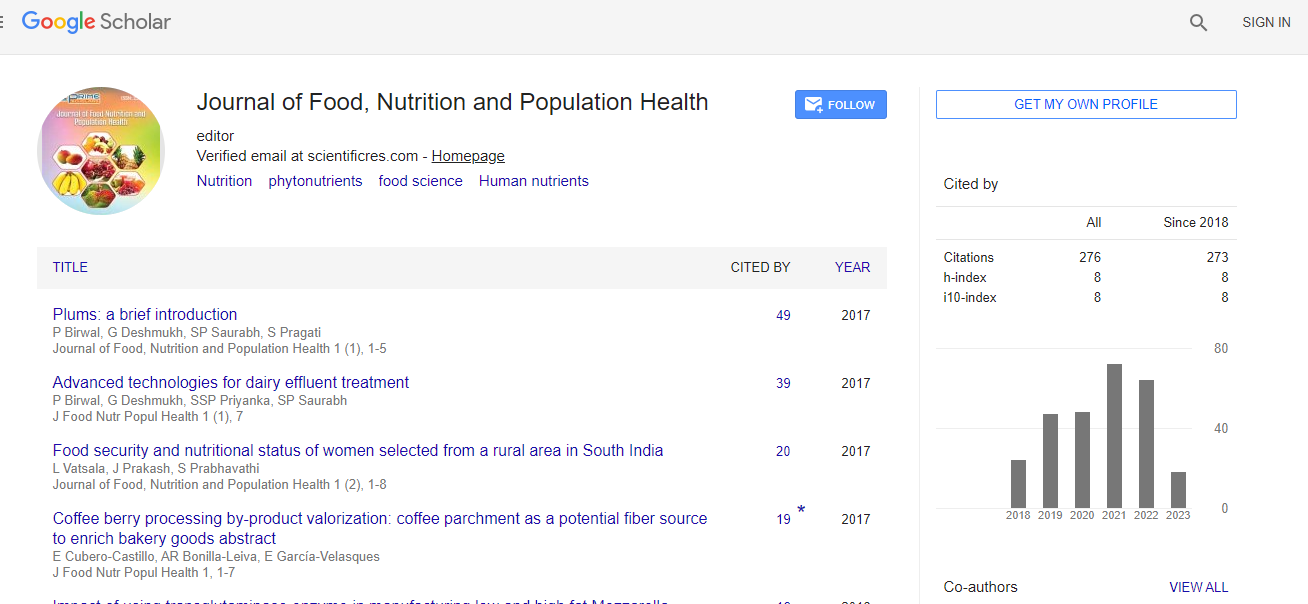Commentary - (2024) Volume 8, Issue 1
The Effects of Overeating: Understanding the Impact on Health and Well-Being
Maya Manuel*
Department of Dietician and Food Sciences, University Of Geneva, Switzerland
*Correspondence:
Maya Manuel,
Department of Dietician and Food Sciences, University Of Geneva,
Switzerland,
Email:
Received: 28-Feb-2024, Manuscript No. IPJFNPH-24-19937;
Editor assigned: 01-Mar-2024, Pre QC No. IPJFNPH-24-19937 (PQ);
Reviewed: 15-Mar-2024, QC No. IPJFNPH-24-19937;
Revised: 20-Mar-2024, Manuscript No. IPJFNPH-24-19937 (R);
Published:
27-Mar-2024, DOI: 10.21767/2577-0586.8.01.08
Description
Overeating, defined as consuming more calories than the body
requires for energy expenditure and metabolic processes, is
a common phenomenon in modern society. While occasional
indulgence is a normal part of life, chronic overeating can
have detrimental effects on health and well-being. This paper
explores the various physiological, psychological, and social
consequences of overeating, shedding light on the importance of
mindful eating habits and balanced nutrition for overall health.
The most immediate consequence of overeating is weight
gain, as excess calories are stored as fat in the body. Chronic
overeating can lead to obesity, a complex condition associated
with numerous health risks, including cardiovascular disease,
type 2 diabetes, hypertension, and certain cancers. Overeating
disrupts metabolic processes, including insulin sensitivity,
glucose metabolism, and lipid metabolism. Prolonged
overconsumption of high-calorie, nutrient-poor foods can lead
to insulin resistance, dyslipidemia, and metabolic syndrome,
increasing the risk of metabolic disorders and cardiovascular
complications. Overeating can cause digestive discomfort,
including bloating, indigestion, acid reflux, and gastrointestinal
distress. Large meals overload the digestive system, leading to
sluggish digestion, delayed gastric emptying, and discomfort.
Overeating often triggers feelings of guilt, shame, and selfcriticism,
particularly in individuals striving to adhere to dietary
restrictions or weight loss goals. These negative emotions
can perpetuate unhealthy eating behaviors and contribute to
a cycle of binge eating and emotional eating Overeating can
be driven by stress, anxiety, boredom, or emotional triggers,
leading to episodes of binge eating or compulsive eating.
However, overeating can also exacerbate stress and anxiety,
as individuals may experience guilt, remorse, and negative
emotions following episodes of overconsumption. Chronic
overeating and weight gain can negatively impact body image
and self-esteem, particularly in societies that place a premium
on thinness and appearance. Individuals may experience
body dissatisfaction, social comparison, and low self-worth
due to perceived failure to meet societal beauty standards.
Overeating behaviors can lead to social isolation and
withdrawal, as individuals may feel embarrassed or ashamed
of their eating habits. Social gatherings, dining out, and shared
meals may become sources of stress or anxiety for individuals
struggling with overeating. Overeating can strain interpersonal
relationships, particularly if family members or friends express
concern or criticism about eating habits or weight gain. Conflicts
over food choices, portion sizes, or meal planning may arise,
leading to tension and discord in relationships. Overeating
can limit participation in social activities, physical recreation,
and leisure pursuits, as individuals may experience physical
discomfort, fatigue, or self-consciousness. Avoidance of social
events or activities that involve food may further isolate
individuals and impede social engagement. In conclusion,
overeating can have profound effects on physical health,
mental well-being, and social functioning. From weight gain
and metabolic dysregulation to guilt, stress, and social isolation,
the consequences of overeating extend beyond the physical
realm to impact various aspects of life. Recognizing the signs of
overeating, understanding its underlying causes, and adopting
mindful eating habits and balanced nutrition are essential
steps toward promoting health, happiness, and overall wellbeing.
By fostering a healthy relationship with food, practicing
moderation, and seeking support when needed, individuals
can mitigate the negative effects of overeating and cultivate a
positive relationship with food and their bodies.
Acknowledgement
None.
Conflict Of Interest
None.
Citation: Manuel M (2024) The Effects of Overeating: Understanding the Impact on Health and Well-being. J Food Nutr Popul
Health. 8:08.
Copyright: © 2024 Manuel M. This is an open-access article distributed under the terms of the Creative Commons Attribution
License, which permits unrestricted use, distribution and reproduction in any medium, provided the original author and source
are credited.

